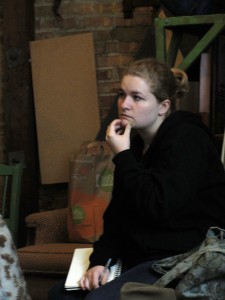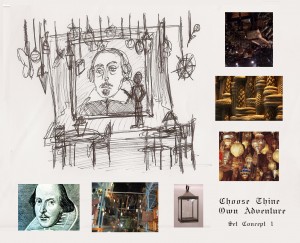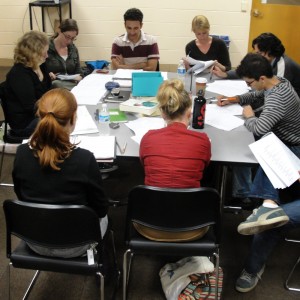This week the Filament Blog asks the question, “What was your first experience with Shakespeare?” Ensemble members and the Choose Thine Own Adventure cast weigh in on middle school plays, boring high school English classes, and Leonardo diCaprio. Sharing all these stories has made us wonder – What was your first encounter with Shakespeare? Comment below and let us know!
My most memorable Shakespeare casting was as a dancer in a Maui production of Comedy of Errors. It was set in New York’s 1970’s Studio 54 club, complete with drugs, boas, glitter, plenty of polyester and numerous Diana Ross dance numbers. It was hilariously awful and yet fabulous as only a room lit with a mirror ball can be. To this day, every time I hear Amii Stewart’s cover of “Knock On Wood” I expect to see twin Dromios in white bell bottoms dancing on a bar.
-Allison Powell, Business Manager and Adapter of Choose Thine Own Adventure
When I was seven, my mom took me to a production of The Tempest at a local college. The images from that play have stuck with me ever since. I don’t think I knew at that point that Shakespeare was supposed to be “hard” to understand, so I understood the meaning of every moment. That experience fixed Shakespeare in my mind as something thrilling. Seven years later I played Puck in my highschool’s Midsummer. Inhabiting the words and actions of Shakespeare at that moment caught me hook line and sinker and I’ve been caught ever since!
-Omen Sade, Associate Artistic Director and Bernardo in Choose Thine Own Adventure
The first Shakespeare play I was ever in was Much Ado About Nothing. I was twelve years old, and I played Benedick. After that, I thought I knew everything there was to know about Shakespeare and probably annoyed the bajeezus out of all of my friends. That continues to this day.
-Reggie Gowland, Ensemble Member
Village Hypochondriac: “The Queen has demanded a new Will Shakespeare play.”
Will Shakespeare: “But I don’t have one ready. Can’t she just write one herself!”
Village Hypochondriac: “I’ll give her your reply sir!”
Will Shakespeare: “NO no no no”
Thus begins every performance of Instant Shakespeare performed at Renaissance Festivals across the country. After this set up, the actors launch into creating a new Shakespeare play based on one of the classics (the first one I saw was Romeo & Juliet); however Shakespeare would ask the audience for help through the process. Names, circumstances, and insults from the audience filled in this Madlib Shakespeare that would then unfold before the audience full of improvisations in Iambic pentameter and audience involvement. To give an idea of the atmosphere, when the audience was asked for an insult, a jolly portly gentleman holding a huge smoked turkey leg (you know the guy) yelled out: “YOU VOMITUS PENNY PINCHING SCUM!” (That insult has been a part of my family’s vocabulary ever since.) At 6 years old, this was my first exposure to Shakespeare and quickly became something I looked forward to every year when my family attended the Renaissance Festival. From that point on, I knew that there was an underlying joy and playfulness in Shakespeare’s plays, and later when I read my first Shakespeare play in English class (you guessed it… Romeo & Juliet), I was able to connect with the joy and irreverence inspired by Instant Shakespeare.
-Christian Libonati, Managing Director
My first experience with Shakespeare was in 7th grade when we were required to read Romeo and Juliet, I distinctly remember hating the play. I get so angry at how silly the whole thing is, all of it could have been so easily avoided. What made it worse was when our teacher made us sit through the 1968 film version. That was pure torture. It wasnt until my senior year of high school that I would learn to love the bard. I read Macbeth, which to this day, is my favorite Shakespeare play.
-Shayna Kamilar, Production Manager
My first “Shakespeare encounter” occured in 7th grade, and was the result of two simultaneous events. First, as part of our English cirriculum, we were to cover both Romeo and Juliet and Julius Caesar. Second, there was a speech contest which occured each year for 7th graders and encompassed several topics – one of those was dramatic interpretation (in other words, a monologue). I chose Cassius’ monologue from I.ii, which begins “Why, man, he doth bestride the narrow world/Like a colossus…” So there I was reading Romeo and Juliet in class, as well as working on a Shakespeare speech for the speech contest. A Shakespeare nerd from the start, you might think. Well, that simply was not the case! I still had glorious dreams of being a professional baseball player, and was riding high on skipping a level of the local leagues due to my great tryout the previous fall. In my free time I was most likely playing video games, sports, or chasing girls – theatre, Shakespeare in particular, was the least of my interests.
The speech contest went well (I scored high, but did not win), and I received high marks in English. I can’t say that some seed was planted at that moment, but I certainly can remember that I felt an affinity for the language (even if I didn’t understand a lot of it). I don’t know when I first really considered acting seriously as a field of study, and eventually a profession, but I do know that every time I have come across an opportunity to study Shakespeare, or work on a Shakespearean production, there has been some unseen pull toward his language. If you went back in time and told my 11 year-old self that he would be an actor, and have an affinity for Shakespeare’s works, he would probably laugh at you, and yet still have some subconscious understanding of that future reality.
-Marco Minichiello, Dromio in Choose Thine Own Adventure
When I was about eight, my grandparents showed me Franco Zeffirelli’s Romeo and Juliet. I was instantly obsessed (I mean, John McEnery’s Queen Mab speech is killer, right?!). I spent an enormous part of the subsequent months performing the balcony scene in my house, using the staircase landing as the balcony and my four year old sister as Romeo. She had a pretty impressive speech impediment at the time, and to this day I can hear her little voice saying “He jests at scaws that nevew fehwt a wound!” In the two decades since then, my sister has outgrown her speech impediment, but I’m still going strong with my love of the Bard.
-Julie Ritchey, Artistic Director and Director of Choose Thine Own Adventure
When I was just a few years old my mom–who is a theatre teacher at a private school in San Diego–directed a production of Hamlet. My dad guest-starred as the Ghost. I don’t remember very much from the production, but I do have a few blurry images in my head. I certainly liked the sword-fighting (which, I believe, my dad also choreographed). Sword-fighting may have played a big role in drawing me into the theatre–when, as a kid, I had to keep myself entertained while my mom finished a rehearsal, I’d get to play with some of the prop swords that were always lying around.
-Jack Novak, Ensemble Member
I read Othello in high school with my remedial English class and I do not remember if I understood what happened in the play but I remember that I was mad at everybody for not acting the parts out. How could they just read this stuff without any emotion?
The second most memorable moment was when I read Merchant of Venice unassigned one summer before my senior year of college. It was the first Shakespeare play I read on my own accord and the first time I understand the story. I remember the moment I finished the play. I was sitting in an upstairs part of the library where I worked during the summer and the sun was coming in on my face. I remember being very hungry and I was poor at the time so I kept myself busy that week with this play. I needed nourishment and this play supplied it. I never told anybody about this but I guess I have now. I really saw this play happening as I read which was the first time visualization had happened throughout an entire Shakespeare play. I want to re read it now just thinking about this moment.
-Mary Spearen, Development Director and Rosalind in Choose Thine Own Adventure
Shakespeare is to the English language as the moon is to the sky, it is as though the two always belonged together, describing love and the pain that comes with the journey that is the path of life. I must say that my early experience with the Bard was as an explorer of words, as a creature in love with the texture and smell of old books and the oceans of words upon the shelves. It is from some such exploration that a weathered copy of the Complete Works cast its breath upon my face like some volume of sacred text, calling forth the boy to worship at its soft and faded page. And with its voice taking my hand and softly whispering some reminder of what I was to come to know. I don’t think I fully understood at the time what I was looking at, but I knew right away that it was a very important part of the history of life. I knew even then that it had the power to change lives.
–Peter Oyloe, Marketing Director
My first encounter with Shakespeare was more tangible than most, it was not by reading any of his plays or even attending one of them. At age 10 I visited Stratford-upon-Avon and have fond memories of visiting the various landmarks around the town, my favorite being Anne Hathaway’s cottage. Here I purchased a beautiful, picture book edition of A Midsummer Night’s Dream. Upon returning home, I immediately rented the movie edition, read the actual play and thus began a love of “the bard.”
-Kristen Ahern, Costume Designer of Choose Thine Own Adventure
My sister put up a giant poster of Leonardo DiCaprio from Romeo + Juliet behind the fish tank on her wall – when I say giant, I mean takes up half the wall space giant. I was 10. I would sneak into her room and kiss the poster!
-Carolyn Faye Kramer, Ensemble Member
High school sucks and here is why. I had the greatest English teacher in the world. Did I know or appreciate it at the time, no. Example, in addition to reading poetry, and studying drama, this guy brought us on field trips to the Ruth Page Theatre (now Chicago Shakes) to see incredible productions. As a 15 year old (at least in 1996) there is nothing more uncool than liking Shakespeare. So, I distinctively remember sitting in the front row of a matinee of Comedy of Errors with my arms folded across my chest, slumped into the chair with my coat still on, acting way too cool for school. This was all for show (or at least to keep the bullies at bay). Inside I was dying with excitement. I LOVED every second. The mistaken identities, watching the Dromios get pummeled, the prat falls, the lights, the costumes, the music, the oh so happy ending… it was awesome! Those matinees have a lot to do with how and why I’m an actor today. The coolest part is I’ve now shared the stage with some of those guys I grew up watching and admiring. So to Mr. T. I thank you. Even though there was no way you could have known it then, I was deeply in love (and still am) with the things I was exposed to in your class.
-Ryan Reilly, Ensemble Member
I don’t remember my first encounter with Shakespeare but it must have been much like my first encounter with chocolate. That stalwart and king of sugary treats has always been in my sensory memory just as Shakespeare seems to have always been a part of the ether of my nostalgic subconscious, sweetly satiating the appetite of my intellectual curiosity and theatrical cravings. Over the years I’ve tasted chocolate in a plethora of forms — dark, milk, white, with peanut butter, rice crispies, jalapenos, etc — and have similarly seen Shakespeare’s works in classical theater style, post-modern interpretations, recontextualizations of all sorts, and in Japanese samurai cinema. That’s the deliciously beautiful thing about chocolate and Shakespeare, they go well in almost any form. The reason, I think, is because at some very basic level, they hit us in the pit of our brains, arousing some fantastic and cathartic feeling in our cores, satisfying a primal human desire to feel joy. And although too much chocolate can lead to a number of health concerns, too much Shakespeare only makes me wish the Bard was still around to share the second Twix bar with.
-Ped Naseri, Antonio in Choose Thine Own Adventure











